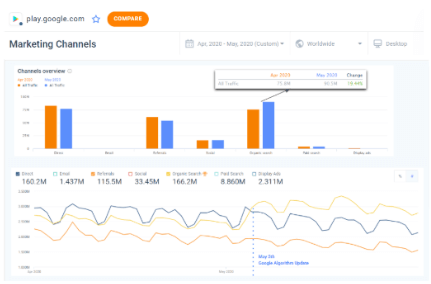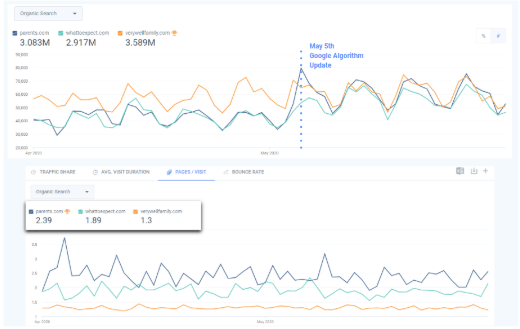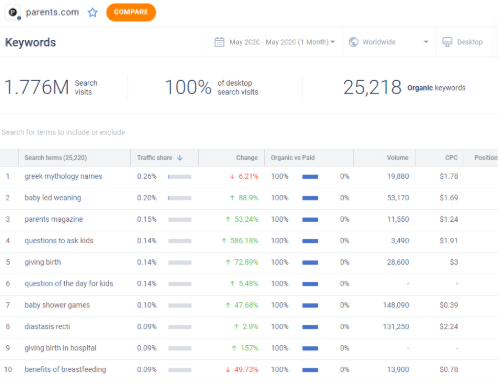
Source: https://www.similarweb.com/corp/blog/winners-losers-from-googles-may-2020-seo-algorithm-update/
It’s no secret that Google updates its SEO algorithm at least once a year. The reason for this is that Google wants the most engaging content to rank high and appear on the first page of the search engine, and for less relevant content to drop down. Naturally, as people’s interests change, the algorithm must also change to achieve that goal. This means that as content gains relevancy, the algorithm changes will move results higher in the ranks. Additionally, new content is constantly being created so Google has to reassess and account for content that didn’t previously exist.
Google’s first 2020 algorithm update was in January, but due to the Coronavirus outbreak, interests very quickly changed and drove the search engine to do a second update just several months later in May. Unsurprisingly, the health crisis drastically changed how people were using Google and what types of information people were seeking. Google stated that the company has never seen as many searches for a single topic as it has since the COVID-19 outbreak, and the SEO algorithm update would hopefully make it easier for people to find the information they are seeking.
That said, we couldn’t help but wonder, once the dust settled, which websites had benefited from this change. Naturally, we dug into the data and used SimilarWeb to analyze the biggest winners from Google’s May 2020 Core Algorithm Update.
The Impact on Google Itself
When comparing April to May, Google Play experienced a 20% growth in organic traffic while all of its other traffic sources declined. Organic traffic actually overtook Direct traffic as the main channel driving visits.

In this case, it’s important to note that search engines, no matter how strong the algorithm, are unable to understand content the way people do. This means that search engines are required to rely heavily on signals and page links to understand the relevancy of content and how it relates to other players, industries, categories, etc. Since Google Play has been constantly growing for months and only saw about a 16% increase in traffic from this algorithm update, the biggest significance to note is that Google’s offerings are continuing to grow in popularity. In comparison to other winners from this algorithm update, 16% is rather small and doesn’t indicate that Google was aiming to boost its own SEO traffic.
Which Types of Sites Benefited the Most?
Google’s focus is very clear. It is promoting websites that demonstrate high rates of engagement. Given that almost every country is either encouraging or mandating citizens to practice social distancing, in addition to many geos shutting down schools, it’s not surprising that parenting-related websites are very popular and have greatly benefited from Google’s algorithm update.

Parents.com and whattoexpect.com have better engagement metrics than verywellfamily.com, and saw massive organic traffic increases while Verywell Family didn’t experience the same trend following the algorithm update. Parents.com currently holds the title for the most pages per visit, followed by WhatToExpect in second, and VerywellFamily coming in last.
A Look at Parents.com
Since Parents.com experienced the most dramatic increase in organic traffic, we investigated what were the influencing factors that propelled the massive growth, and ultimately found much of it was clearly related to Google’s update.

Parents.com saw a 40% increase in its organic traffic throughout May, with a mindblowing 56% increase on May 5th compared to the previous day.

Unsurprisingly, as its organic traffic skyrocketed, parents.com experienced a significant increase in traffic from 8 out of 10 top keywords in May. In fact, the keyword phrase questions to ask kids grew by a whopping 586%. Interestingly, while some common searches like baby led weaning increased traffic as well, there was overall a clear connection between keywords driving traffic and Coronavirus-related restrictions.
For example, the keyword phrase giving birth in hospitals grew by 157% and giving birth increased by approximately 73%, which is most likely related to women looking up information about what they could expect their birth experiences to look like during this pandemic. During May, many states, including New York and Texas, were debating whether or not women giving birth should be allowed to have their partners in the delivery room with them, which could account for some of the increased interest in this keyword phrase as well.

What Does Google’s Algorithm Change Mean for You?
Google’s algorithm change will impact every website differently. It does, however, mean an SEO tool like SimilarWeb is needed to help understand how your website and target keywords have been impacted. SimilarWeb’s data shows how your (and your competitors’) organic traffic changed from April to May. It provides the insights needed for marketers to reassess which keywords are experiencing traffic share gains and losses so your SEO strategy can be adjusted accordingly.
To learn more about the data behind this article and what Similarweb has to offer, visit https://www.similarweb.com/.







Sign up to receive our stories in your inbox.
Data is changing the speed of business. Investors, Corporations, and Governments are buying new, differentiated data to gain visibility make better decisions. Don't fall behind. Let us help.







Sign up to receive our stories in your inbox.
Data is changing the speed of business. Investors, Corporations, and Governments are buying new, differentiated data to gain visibility make better decisions. Don't fall behind. Let us help.